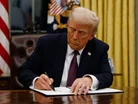What Could Trump's Tariffs Mean for Climate Tech?

US President Donald Trump's sweeping tariffs on China have ignited fears of a global economic conflict with significant implications for renewable energy, electric vehicles and climate technology
The 10% levy on all Chinese imports was swiftly met with retaliatory measures from Beijing, targeting US exports of the likes of oil, LNG, vehicles and farming equipment.
Trump's planned 25% tariffs on Canadian and Mexican imports were temporarily suspended following last-minute negotiations with Canadian Prime Minister Justin Trudeau and Mexican President Claudia Sheinbaum.
While Europe has not yet faced tariffs, Trump has hinted at potential restrictions, causing concern among business leaders and government officials.
China has filed a complaint with the World Trade Organization (WTO), describing the tariffs of a “malicious nature”.
Trump, however, views this as an "opening salvo," warning of potentially "very, very significant" tariffs if negotiations fail.
Impact on the sustainability sector
The tariffs, though not explicitly targeting clean energy, are expected to significantly affect climate technology.
Trade has been crucial in facilitating renewable energy growth, with subsidies, feed-in tariffs and international competition driving down costs for technologies like solar power.
“It probably slows down the energy transition because it drives up costs, especially the tariffs on China, and creates chaos in supply chains", says David Victor, Professor of Innovation and Public Policy at the University of California, San Diego.
Global trade implications
China's dominance in lithium-ion battery production, approximately 75% of global output, and its new tariffs on 25 critical minerals could have far-reaching consequences.
Canada and Mexico, major players in steel and EV production, could also see significant impacts.
The tariffs may lead to increased prices globally as companies attempt to offset losses in the US market.
“It is highly disruptive to the global supply chain, and of course the clean energy one as well,” says Gernot Wagner, Climate Economist at the Columbia Business School.
Europe's response and CBAM
While the EU has not yet been targeted, concerns are growing.
Dr Aurélien Saussay, Assistant Professor at the Grantham Research Institute on Climate Change and the Environment, has warned that retaliatory tariffs from the EU could be disastrous for both sides.
“These tariffs will impact the American economy, not just Chinese and European sectors, so Donald Trump plowing ahead with these policies if elected would be awful for economies across the globe,” he says.
The EU's Carbon Border Adjustment Mechanism (CBAM) could potentially be used as an economic retaliation tool, but Aurélien advises against this approach.
“The EU should refrain from using its carbon border adjustment mechanism as a conduit for retaliatory measures as it would require an unrealistically high carbon price on the embodied emissions of US imports and could weaken the acceptability of the border carbon tax for the EU’s trade partners,“ he explains.
As global trade relations reach a critical point, the clean energy transition risks becoming collateral damage in an escalating economic conflict.
The potential for increased costs, supply chain disruptions and reduced market access looms large over the climate tech sector
What next?
With tariffs already in effect and threats of further economic restrictions looming, global trade relations are at a critical juncture.
If tensions continue to rise, businesses in the climate tech sector could face increased costs, supply chain disruptions and reduced market access.
“Retaliatory measures by China or the EU would likely worsen economic outcomes for all parties involved, potentially sparking a damaging trade war,” Aurélien says.
As the US, China, Canada, Mexico and Europe navigate these uncertainties, the clean energy transition could become collateral damage in a growing economic battle.
Make sure you check out the latest industry news and insights at ClimateTech Digital and be part of the conversation at our global conference series, Sustainability LIVE.
Discover all our upcoming events and secure your tickets today. Subscribe to the ClimateTech Digital newsletter.
ClimateTech Digital is a BizClik brand

